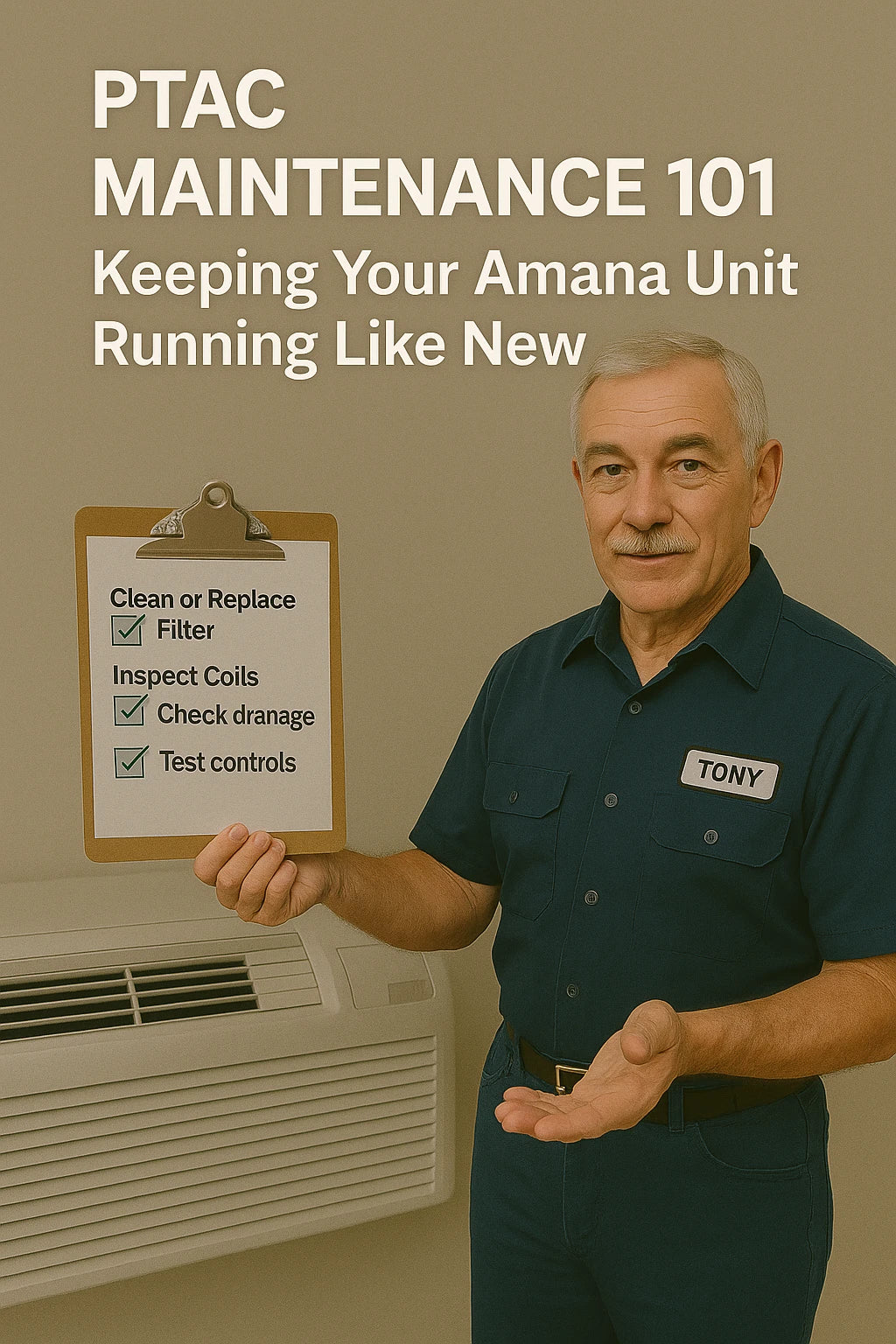🧰 Introduction: Why Maintenance Matters
You might think your PTAC unit is a "set it and forget it" appliance. It’s not. Whether it’s cooling hotel guests or warming assisted living suites, a properly maintained PTAC like the Amana Distinctions 12000 BTU unit can run for a decade or more. Neglect it? You’ll be replacing units years ahead of schedule.
As Tony Marino, let me show you the simple PTAC maintenance practices that save you thousands in repairs and replacements.
📅 Maintenance Frequency Guide
| Task | Frequency |
|---|---|
| Clean Air Filter | Monthly |
| Clean Evaporator Coil | Every 6 months |
| Inspect Condensate Drain | Quarterly |
| Check Electrical Connections | Annually |
| Verify Thermostat & Controls | Annually |
| Clean Outdoor Grille & Coil | Annually |
| Professional Service Check | Every 2-3 years |
ASHRAE HVAC Maintenance Standards
🌬️ Filter Maintenance: The Easiest Money Saver
Dirty filters choke airflow, forcing the PTAC to work harder.
Steps:
-
Remove front grille (usually clips off easily)
-
Slide out air filter
-
Wash with mild soap and warm water
-
Air dry completely before reinstalling
Pro Tip:
-
Keep spare filters on hand to minimize downtime.
-
Replace heavily worn or damaged filters immediately.
💧 Condensate Drain Maintenance: Don’t Invite Water Damage
PTAC units naturally produce condensate while cooling.
Check:
-
Interior drain pan (look for standing water)
-
Rear condensate outlets or weep holes
-
External drain kits (if installed)
Clean:
-
Use soft brush or compressed air to clear obstructions
-
Flush external drain lines with mild bleach solution (avoid harsh chemicals)
Signs of Trouble:
-
Water pooling beneath unit
-
Musty smells (indicates mold/mildew growth)
🌀 Coil Cleaning: Keep Heat Exchange Efficient
Both indoor (evaporator) and outdoor (condenser) coils attract dust, dirt, and pollen over time.
Indoor Coil:
-
Access by removing front cover
-
Use coil brush or soft vacuum brush
-
Light detergent coil cleaners can be applied
Outdoor Coil (rear grille):
-
Clean exterior louvers with gentle hose spray (avoid pressure washers)
-
Use fin comb to straighten bent fins
Pro Tip:
-
Clean coils during shoulder seasons (spring & fall) for peak performance.
Energy Star Coil Maintenance Guide
⚡ Electrical Inspections: Don’t Skip Safety Checks
Annually Inspect:
-
Power cords for wear or heat damage
-
Plug connections inside wall sleeve
-
Control board and thermostat wires
-
Secure mounting of electrical components
Hire licensed electrician if:
-
You find loose or frayed wiring
-
Breaker frequently trips
-
Unit smells hot or sparks
NFPA Electrical Safety Code (NEC):
🔊 Noise & Vibration Issues: The Silent Cost Creeper
A properly maintained PTAC runs quietly — typically 46-52 dB for the Amana Distinctions model.
Causes of Excess Noise:
-
Loose front grille
-
Dirty or off-balance blower wheel
-
Foreign objects inside sleeve
-
Fan motor bearing wear
-
Loose mounting brackets
Pro Tip:
-
Listen for unusual noises during routine filter changes — catch issues early.
Amana PTAC Noise Troubleshooting Guide:
🛠️ Control Board & Thermostat Testing
Your PTAC’s control board manages:
-
Compressor cycling
-
Reversing valve (heat pump mode)
-
Backup electric heat activation
-
Fan speeds
Test:
-
Verify proper heating and cooling transitions
-
Confirm electric backup kicks in below 35°F outdoor temp
-
Check remote thermostat calibration if used
📉 The Cost of Neglecting PTAC Maintenance
| Neglect | Result | Cost Impact |
| Dirty Filters | Reduced airflow | +15% energy waste |
| Dirty Coils | Lower efficiency | +20% energy waste |
| Blocked Drain | Water leaks | Costly wall/floor repairs |
| Ignored Noise | Component failure | Early unit replacement |
| Loose Wires | Fire hazard | Liability risk |
U.S. DOE HVAC Efficiency Studies:
✅ Tony’s 5 Golden PTAC Maintenance Rules
1️⃣ Clean your filters monthly — religiously.
2️⃣ Wash coils spring and fall.
3️⃣ Check condensate drainage quarterly.
4️⃣ Inspect electrical annually.
5️⃣ Document maintenance for warranty protection.
Treat your Amana Distinctions PTAC right and it’ll give you 10+ years of reliable, efficient comfort. Your guests stay happy. Your wallet stays happy. And that’s what I call good HVAC work.
In the next topic we will know more about: What Is EER and Why Does It Matter for PTAC Efficiency?







